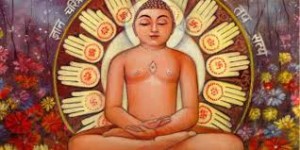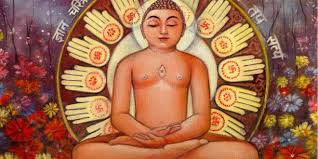 Having observed the most server penances for 12 years, and having obtained perfect knowledge and enlightenment, Bhagwan Mahavir, over 2,500 years ago declared that, “since all living beings, in whatever form of live or existence they are, they, love, desire, and like to live happy and detest unhappiness and hate to be killed, non-violence is the most sacred covenant for all of humanity”.
Having observed the most server penances for 12 years, and having obtained perfect knowledge and enlightenment, Bhagwan Mahavir, over 2,500 years ago declared that, “since all living beings, in whatever form of live or existence they are, they, love, desire, and like to live happy and detest unhappiness and hate to be killed, non-violence is the most sacred covenant for all of humanity”.
Mahavir goes on to pronounce, “You are the one, you deem fit to kill, to obey your command, to inflict torture, to seize by force, to snatch away life. The noble one spends life with self-discretion. He neither kills, nor injures any living being. One who commits violence has to suffer the bitter fruits later on. Hence, let no one ever think of committing violence against anyone”.
This is the substance of the message of Mahavir. He preached nonviolent, honest, truthful, moral and legal ways of earning a living. He proposed the imposition of voluntary limits on human-greed and possessions. He promoted the distribution of wealth for charitable purposed towards the elimination of hunger, disease, ignorance, fear, injustice, and violence – individual or collective. He strongly desired the eradication of casteism.
On matters concerning intellectual discussion, religion, faith, and philosophy e.g. the nature of truth and its expression in language, Mahavir opened the floodgates of freedom of expression through his unique doctrine of Anekanta i.e. the principle of multiple views, which in effect means respect, tolerance and sympathy of others’ views on matters of fact and opinion.
On the strength of realization of his own true self, Mahavir, firmly and explicitly declared that in the cycle of life as human beings, each individual has the full potential and capability of attaining perfect divinity and his own salvation. The differences among millions of forms of life belong to the stages of evolution, and not the fundamental potential, which means that all living beings including animals, birds, aquatic life and forms of vegetation are equally entitled to the right of life.
The whole infra-structure of Jainism is thus interwoven around a nonviolent way and style of life, which is compassionate and sharing. Inspired by and depending upon these guiding principles, the Jains have enjoyed an absolutely glorious past and have profusely contributed to all phases and aspects of Indian history and culture.
But now the challenges that Jains and all major religions of humanity are going to face with the advent of the 21st century, which is going to be positively dependent on science and technology, will be much different. Basic questions about the faith in, and the truth of the fundamental postulates of Religion are going to be asked with greater vehemence. The validity of the universe as a creation of God, man as a symbol and representative of God’s will in his own image, all the theories of good/bad human deeds and their resultants in the form of merits and demerits, happiness and pain, or heaven and hell, and all the theories of salvation will be questioned.
Through prehistoric times, the Jains, collectively and individually, have been known and respected as patriotic, truthful, compassionate, and tolerant people. They have made unique contribution to Indian history, arts, culture and sciences. The stage has now been reached, and will be glaringly so, to reach out to the suffering humanity. Let us be prepared, then to offer the best of our heritage in religion, spirituality and knowledge in sciences and arts to the future generations.
Courtesy jainsamaj.org. The 2618th birth anniversary of Bhagwan Mahavir is being celebrated on March 29.
Dr. Vimal Prakash Jain







